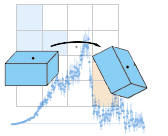
| HOME | PEOPLE | RESEARCH | ACADEMICS | TRAVEL/VISITORS | LINKS | CONTACT |

|
Web Mail
Mailing Lists
Computing Resources
Site Map
Lagrangian Averaged Navier-Stokes-alpha (LANS-alpha) Model for Turbulence: Connections to LES and New Directions
Darryl D. Holm, Theoretical Division and Center for Nonlinear Studies, Los Alamos National Laboratory
Friday, October 25, 20021:30 PM to 2:30 PM
Steele 125
The Lagrangian Averaged Navier-Stokes-alpha (LANS-alpha) model is a turbulence equation that was developed jointly at Caltech, UC Davis and Los Alamos. It uses
1. Reynolds decomposition(s), Taylor's hypothesis and Lagrangian averages,
2. Hamilton's principle, Averaged Lagrangians and Euler-Poincare equations,
3. Navier-Stokes viscosity in the isotropic case, and a modified anisotropic viscosity otherwise,
to represent the mean dynamical effects of fluctuations on 3D incompressible fluid motion. When the length-scale alpha tends to zero, the LANS-alpha equations reduce to the Navier-Stokes equations. We shall
- Review recent results of the LANS-alpha model
- Discuss its relation to Large Eddy Simulation (LES) models and show comparisons
- Sketch an approach for modifying the LANS-alpha model to include rotation and stratification. This requires abandoning Taylor's hypothesis of "frozen-in" turbulence and deriving a new model that accounts for wave-mean flow interactions in the framework of 1. - 3. above.
|
©2003-2011 California Institute of Technology. All Rights Reserved webmaster |
|